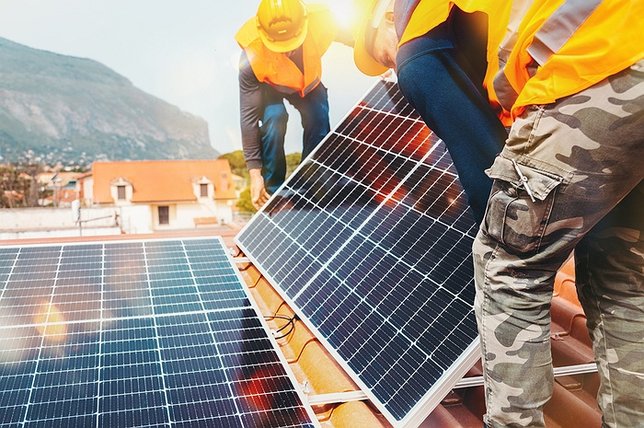Governor Kathy Hochul today announced the $12 million Heat Recovery Program to modernize buildings in New York State, focusing on decarbonization and retrofit projects that reuse heat to save energy and reduce fossil fuel use in buildings across the State. The practice of heat recovery, which is recuperating wasted heat and reusing it directly or storing it for later, represents a promising approach to building decarbonization, and helps accelerate progress toward the State’s Climate Leadership and Community Protection Act goal to reduce greenhouse emissions 85 percent by 2050.
“New York’s robust statewide decarbonization efforts are bringing forward innovative and replicable approaches to lowering building emissions and combatting climate change,” Governor Hochul said. “Through this new initiative using heat recovery, we will help increase the adoption of heat recovery solutions, make building operations more affordable, and promote a healthier living environment for more New Yorkers across the state.”
Administered by the New York State Energy Research and Development Authority (NYSERDA), this open-enrollment funding is available to projects in existing commercial, multifamily, institutional, and industrial buildings in New York State. For awarded projects, NYSERDA will provide up to a 75 percent cost share, with maximum awards of $40,000 for the production of heat recovery opportunity assessments, and $80,000 for the development of design and construction plans for heat recovery projects. Heat recovery projects will include the capture and transfer of rejected heat to lower the energy used by other systems, such as heat rejected and captured from cooling and dehumidification, ventilation exhaust, or wastewater processes. Low-to-moderate income multifamily housing is eligible for up to 100 percent cost share, and NYSERDA will dedicate $3 million of the total funding exclusively for projects in low-to-moderate multifamily housing buildings.
NYSERDA President and CEO Doreen M. Harris said, “NYSERDA is pleased to add the Heat Recovery Program to its portfolio of available offerings that aim to increase energy efficiency and advance the use of new decarbonization technologies. Buildings, even those that are well-run, waste heat through a variety of processes including ventilation, cooling and wastewater. Applying heat recovery to building operations lowers costs by recapturing energy that has already been paid for and reduces overall greenhouse gas emissions, resulting in safer, more sustainable living conditions.”
Applications for the Heat Recovery Program are now open, and funding will be made available on a first come, first served basis. For more information on heat recovery, including project specific case studies and program details, please visit here.
Today’s announcement builds on NYSERDA’s Heat Recovery Solutions Request for Qualifications (RFQL), which qualifies a wide range of heat recovery solution providers to publish actionable information on the efficacy of heat recovery technologies and increase customer confidence in the viability of heat recovery as a retrofit strategy.
Buildings are one of the most significant sources of greenhouse gas emissions in New York State and through NYSERDA and utility programs, over $6.8 billion is being invested to decarbonize buildings statewide. By improving energy efficiency in buildings and advancing installations of onsite storage, renewables, and electric vehicle charging equipment, the State will reduce its carbon pollution and achieve its ambitious target of reducing on-site energy consumption by 185 TBtu by 2025, the equivalent of powering 1.8 million homes.
As authorized by the New York State Public Service Commission, funding for this initiative is through the Clean Energy Fund. More information about this funding is available on NYSERDA’s website.
New York State's Nation-Leading Climate Plan
New York State's nation-leading climate agenda calls for an orderly and just transition that creates family-sustaining jobs, continues to foster a green economy across all sectors and ensures that at least 35 percent, with a goal of 40 percent, of the benefits of clean energy investments are directed to disadvantaged communities. Guided by some of the nation’s most aggressive climate and clean energy initiatives, New York is on a path to achieving a zero-emission electricity sector by 2040, including 70 percent renewable energy generation by 2030, and economywide carbon neutrality by mid-century. A cornerstone of this transition is New York's unprecedented clean energy investments, including more than $55 billion in 145 large-scale renewable and transmission projects across the state, $6.8 billion to reduce building emissions, $3.3 billion to scale up solar, more than $1 billion for clean transportation initiatives, and over $2 billion in NY Green Bank commitments. These and other investments are supporting more than 165,000 jobs in New York’s clean energy sector in 2021 and over 3,000 percent growth in the distributed solar sector since 2011. To reduce greenhouse gas emissions and improve air quality, New York also adopted zero-emission vehicle regulations, including requiring all new passenger cars and light-duty trucks sold in the State be zero emission by 2035. Partnerships are continuing to advance New York’s climate action with nearly 400 registered and more than 100 certified Climate Smart Communities, nearly 500 Clean Energy Communities, and the State’s largest community air monitoring initiative in 10 disadvantaged communities across the state to help target air pollution and combat climate change.










